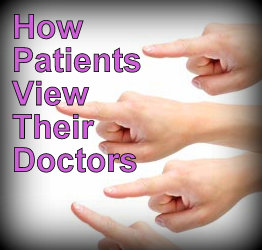Survey by Thyroid Patients as to How They View Their Doctors — not a pretty picture!
 Recently, Stop the Thyroid Madness LLC implemented a survey to discern thyroid patient observations and opinions about the medical professionals they have used. And the results of this poll present alarmingly negative opinions by 1,870 thyroid patients about doctors they have used.
Recently, Stop the Thyroid Madness LLC implemented a survey to discern thyroid patient observations and opinions about the medical professionals they have used. And the results of this poll present alarmingly negative opinions by 1,870 thyroid patients about doctors they have used.
Of course, most informed thyroid patients aren’t surprised by the findings of this survey. But to see the responses, and especially the comments made in response to questions 2 – 5, it all certainly underscores how deep the problem is.
As far as which doctors gave the worst treatment according to patients, Endocrinologists led the pack with MD’s following in second. Conversely, Naturopaths gave the best treatment, even though they barely got 1/3 of the responses.
Comments made by patients in response to Question 3 (see below–actions which would have raised the opinions of patients of doctors) were the most enlightening. They ranged from having better knowledge about T3 or desiccated thyroid, understanding the right lab work instead of the TSH, listening to their patients (stated frequently), better understanding of thyroid symptoms, ceasing to tell patients to eat differently or exercise more, not being so afraid of higher doses of NDT, understanding nutrition, stop with the labeling/dismissiveness/arrogance/patronizing, respecting educated patients…and a great deal more which you can read under #3 in the linked page below.
The survey’s five questions with responses were:
Question 1: How satisfied have you been with the way the majority of medical professionals you have seen over the years have treated your thyroid problem? (Choose one response only)
1) VERY SATISFIED — Most medical professionals have helped my thyroid issues.
2) MODERATELY SATISFIED — Some have done well; others have not done as well
3) NEUTRAL — I have no opinion one way or the other
4) NOT SATISFIED — the vast majority of my experiences with doctors have been
negative when it comes to helping me
Question 2: If you chose #1 above, why do you feel very satisfied about your thyroid treatment by the majority of medical professionals you have seen over the years? (Choose any that apply)
1) I feel much better than I did before
2) I have no more symptoms that I understand are related to hypothyroidism.
3) The majority of those doctors were good listeners
4) The majority of those doctors seem to know what they are doing.
5) The majority of those doctors respect my opinions and see me as a partner in my healthcare.
6) Their fees were affordable
7) Other (133)
Question 3: If you chose either 2, 3, or 4 in the first question above: which of the following actions by medical professionals would have raised your opinion of the thyroid care you had gotten? (Choose any that apply)
1) Paying more attention to my symptoms rather than putting focus solely on lab results.
2) Understanding how to read lab results
3) Being offered Natural Desiccated Thyroid or T3 rather than T4-only
4) Going more by the Free T3 and Free T4 plus symptoms, not the TSH
5) Understanding the reality of cortisol problems, plus saliva testing and treatment
6) Understanding the problem of low iron, reading iron labs, treatment
7) Being more open-minded about non-traditional therapies
8) Understanding that my depression could be related to my hypothyroid state.
9) Other (395)
Question 4: When thinking about the types of health care providers you have used over the years, please choose one type that you feel did the WORST job in your treatment.
1) Endocrinologists
2) MD’s (Medical Doctor)
3) DO’s (Doctor of Osteopathy
4) NP’s (Nurse Practitioners)
5) PA’s (Physicians Assistants)
6) Naturopaths
Comments (122)
Question 5: When thinking about the types of health care providers you have used over the years, please choose one type that you feel did the BEST job in your treatment.
1) Endocrinologists
2) MD’s (Medical Doctor)
3) DO’s (Doctor of Osteopathy
4) NP’s (Nurse Practitioners)
5) PA’s (Physicians Assistants)
6) Naturopaths
Comments (565)
TO SEE THE RESULTS OF THIS SURVEY, head on over the SURVEY: Hypothyroid patients view of their doctors page.
Seize the wisdom!!